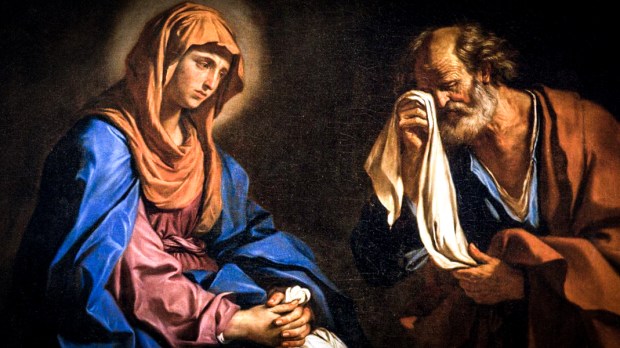Lenten Campaign 2025
This content is free of charge, as are all our articles.
Support us with a donation that is tax-deductible and enable us to continue to reach millions of readers.
“Jesus began to show his disciples that he must go to Jerusalem and suffer greatly from the elders, the chief priests, and the scribes, and be killed and on the third day be raised.”
—Matthew 16:21
This past week, I had the opportunity to take part in a program with ordained and lay minsters representing a number of Christian traditions and nationalities. Although we spent a lot of time working as a large group, at times we were divided into smaller groups for guided discussion.
Within my small group we discussed the reality of evil in the world and how each of us understood grace and salvation. Taking part in the conversation were Catholics and Lutherans from the United States, a Syro-Malabar Catholic priest from India, a Ge’ez Rite (Catholic) priest from Ethiopia, and a Presbyterian minister from Korea. Three of us were members of different Catholic religious communities. Despite the fact that we came from a variety of cultural and ethnic backgrounds, our common belief in the life and mission of Jesus Christ helped us to bridge those differences.
Another of our common beliefs was our understanding that each of us is called to be a disciple of Jesus. This goes beyond simply knowing what the New Testament tells us about Jesus of Nazareth. Instead, our commitment as Christians demands that we go deeper. As disciples we are called to foster our relationship with Jesus, to know him in a personal way. And, as with any important relationship in our lives, our relationship with Jesus changes us, helps us to grow more into the woman or man that God wants to be. The Gospel proclaimed this Sunday helps break open what this relationship can mean for our lives.
To begin with, this Sunday’s Gospel picks up where we left off in last Sunday’s Gospel. Simon has just made a profound statement of faith, acknowledging that Jesus is the “Christ, the Son of the Living God.” In response, Jesus gives Simon a new name—Peter—and places him in a position of authority within the Christian community, giving him the “keys to the Kingdom of Heaven.” It’s a powerful and decisive moment for Peter and the entire Church.
But, as we hear this Sunday, the mood changes quickly as Jesus tells the newly named Peter and the other disciples that Jesus must suffer and die. Peter, always quick to speak, responds in a totally reasonable way: “God forbid, Lord! No such thing shall ever happen to you.” It’s almost impossible for him to believe that what Jesus is saying could be true. After all, everything seemed to be going so well.
But Jesus wants none of Peter’s objections, declaring “Get behind me, Satan! You are an obstacle to me.” Jesus tells Peter to stop thinking only about their friendship and the success of their mission. God’s plans are bigger than anything we can imagine.
An important part of this passage is Jesus’ instruction for Peter to “get behind” him. In a sense, Jesus is reminding Peter that it’s the disciple’s job to follow the teacher. Peter has tried to take on the role of the teacher, dictating to Jesus what can and can’t happen. By doing this, Peter “the Rock” has become a satan, a “stumbling stone” along the way that Jesus is leading his disciples. We know that that path of discipleship becomes the way of the Cross. But, we also know that the Way of the Cross leads into a garden and an empty tomb.
Peter could never have imagined any of this, however. In the passage we hear this Sunday, Peter simply hears his friend and teacher predicting that something horrible is going to happen. It makes perfect sense that he would try to prevent anything from happening to Jesus
But what comes next is very important. Jesus reminds Peter—and us—that it isn’t only his journey. Jesus tells us exactly what is expected of anyone who is going to continue to journey with him: We must deny our own preferences and agendas and imitate him. They are hard words, but their meaning is unmistakable.
Gospel means “Good News” and, although it might not seem like it, even passages like the one we hear this Sunday are good news for us because as we accept the demands of discipleship we are being reminded that we aren’t traveling alone. We aren’t being asked to forge a new path to God because that work has been done by the One whom we follow and who reminds us by His own life that the darkness of Good Friday is followed by the bright light of Easter morning.
Why are the difficult or challenging teachings of Jesus important for us as disciples?When have the good intentions of others been a “stumbling block” for you as you try to follow Jesus? When have you been a “stumbling block” for others?What does it mean for you to deny yourself and embrace the Cross?
Words of Wisdom: “In a mysterious way, Christ himself accepts death … on the Cross, in order to eradicate from man’s heart the sins of self-sufficiency and to manifest to the Father a complete filial obedience.”—Blessed Pope Paul VI

